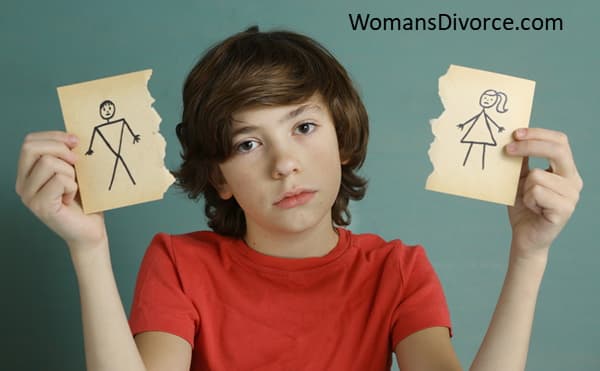- Home
- Children & Divorce
- Preparing Children for Divorce
Preparing Your Children for Divorce
Children are the innocent victims of divorce. They become the center of battles over child custody, support, and visitation. Worst of all, the lines are drawn between the two people they love the most - Mom and Dad.
By Tracy Achen
A Child's Perspective on Divorce

Divorce affects a child in ways that parents don't always consider. They face losing the only lifestyle that they've ever known. In its place are week-end visits with Dad, living with a stressed out Mom, and having reduced resources for everything they used to do.
You can't change this fact, but you can give your kids unconditional love and support to help ease their adjustments. And don't be surprised by your children's reaction to the divorce over the following days and weeks. They may experience anger, anxiety, or depression. Make sure they know they can discuss anything with you and they don't have to choose between you and your spouse. Reassure them that Mom and Dad will continue to love them no matter what.
Provide Stability for Your Children
If at all possible, try to present a united front concerning the divorce. If parents aren't able to sit down together and tell their kids about the impending divorce, they should get together and work out what they will say so they tell their kids the same story. This way, your children will receive the same message about the divorce, no matter which parent they are with. You don't need to provide all the gory details of what caused your marriage to break up. Doing so will only make them feel like they have to take sides.
Most importantly, they need to hear their parents are separating from each other, not them. You need to emphasis they they are not the cause of your divorce, because many kids think the Mommy and Daddy wouldn't be divorcing if they had behaved better. You may need to tell them repeatedly over the coming months that it is not their fault.
And above all, do your best not to fight in front of your children, as this can be very traumatic to them. If you realize you and your spouse disagree on something, find someplace where you can discuss the issues out of earshot of your kids.
Spend extra time with them and give them your undivided attention when you are with them. If you can, try to maintain a regular routine that is similar to what they had before the divorce. For example: eat the same type of meals, have the same bedtime, and maintain the homework and chores schedule that was already in place.
Take Care of Yourself as Well
Because each child reacts differently to divorce, you may sometimes question your abilities as a mother. This can be especially true if your ex suddenly finds fault with everything you do concerning the kids. This is usually a power-play, but it can weaken your self-confidence as a parent. Don't take it personally.
On the other hand, if you think your ex will try to fight you for custody, be sure to keep a journal of everything you do with your children. This can help prove that you are an active and involved parent in your children' lives. Write down all school functions you attend, doctor visits you take your children to, and even play-dates where their friend spend time at your house. Here are more tips on how to prepare for a custody battle.
When everything gets to be too overwhelming, take some time to talk to your friends (especially if they are also dealing with the challenges of raising kids). This can help you regain your bearing, plus give you different ways to deal with the inevitable stress you're under. Raising kids is tough, but divorce adds a whole new set of rules to your job.
But most importantly, figure out how can you be there emotionally for your kids, to help them accept and adjust to their new life. When you're at the end of your rope, realize that you are tougher than you think. Ultimately, you and your children will survive.
A Parenting Plan Can Help
Beyond dealing with your the children's emotions, you will also need to handle all the legalities concerning their living arrangements and their well-being. This is where a parenting plan comes into play. A well thought out parenting plan can help you minimize the trauma your children will face and help lay the ground rules with your ex.
As you prepare your divorce, take into consideration the following questions that are commonly addressed by a parenting plan.
- What will the custody arrangements be? Will one parent have primary physical custody or will physical custody be split? Will both parents share legal custody to make decisions regarding important issues in their child's life, or will sole legal custody be granted to only one parent?
- How often will your children visit their other parent? How will holidays and vacation times be handled? You also need to address who will transport your kids to the other parents house and what will happen if one parent moves far away. Here are some more tips on creating a child visitation schedule.
- How much child support will be owed, how will it be paid, and what happens if your ex-husband doesn’t pay? Most court website have calculators to estimate child support, but the actual child support order will need to be determined by the court.
The following articles can give you more insight on the issues that you will face as you approach a divorce and you have children still at home.
